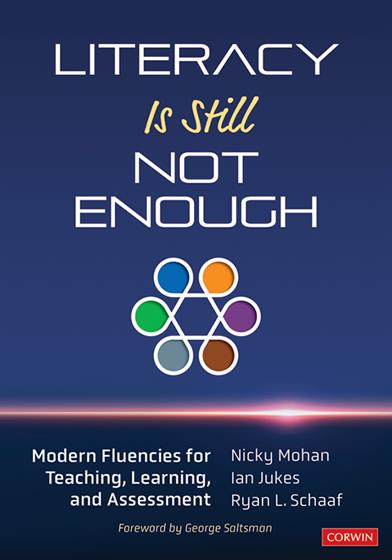Foreword
Preface: Evolution of the Fluencies
Acknowledgments
About the Authors
PART I: Setting the Scene for the Modern Fluencies
Chapter 1: Highly Educated Useless People
Introduction
Chapter 2: Education in the Age of Disruption
Disruptive Innovation
The iPhone as a Disruptor
Disruption Is Everywhere
What Is Exponential?
HyperInformation
Where Do We Begin?
Chapter 3: From Literacy to Fluency: The Starting Point
Literacy Is Still Not Enough
Conscious Application of Essential Skills
Unconscious Application of Essential Skills
Modern Learning Fluencies
The Path Forward
Chapter 4: Modern Learning Pedagogy and the Learning Progression
Learning Theorists and the Modern Fluencies
The Progression of Thought and Learning
The Role of Technology in the Modern Fluencies
Using Mental Processes
Heutagogy and the Fluencies
Modern Learning Skills
Context and Meaning: The Velcro of Learning
Chapter 5: Modern and Future-Ready Learning Environments
Types of Modern Learning Environments
It’s All About Mindsets, Not Materials or Miracles
Know Thy Learner: Cultural Competency
The Learning Space: Fabricating a Place of Imagination and Endless Potential
Essential Attributes of Modern Learning Environments
Screen Time
Cultivating Optimal Learning Environments
PART II: An Introduction to the Modern Fluencies
Chapter 6: Teaching and Learning Using the Modern Fluencies
What Are the 6 Modern Fluencies?
Why There Are Nine Steps to Each Fluency
Chapter 7: Solution Fluency: Real-World Problem Solving
Step 1: Define
Step 2: Determine
Step 3: Discover
Step 4: Dream
Step 5: Design
Step 6: Deliver
Step 7: Diagnose
Step 8: Debrief
Step 9: Decide
Chapter 8: Collaboration Fluency: Global Connections
Step 1: Explain
Step 2: Establish
Step 3: Explore
Step 4: Envision
Step 5: Engineer
Step 6: Execute
Step 7: Examine
Step 8: Evaluate
Step 9: Extend
Chapter 9: Information Fluency: InfoWhelm and HyperInformation
Step 1: Ask
Step 2: Audience
Step 3: Access
Step 4: Authenticate
Step 5: Assemble
Step 6: Apply
Step 7: Assess
Step 8: Analyze
Step 9: Action
Chapter 10: Communication Fluency: Text and Multimedia
Step 1: Pose
Step 2: Pinpoint
Step 3: Prepare
Step 4: Picture
Step 5: Plan
Step 6: Produce
Step 7: Probe
Step 8: Ponder
Step 9: Pledge
Chapter 11: Creativity Fluency: Innovation and Imagination
IQ versus CQ
Step 1: Illustrate
Step 2: Identify
Step 3: Inquire
Step 4: Imagine
Step 5: Initiate
Step 6: Implement
Step 7: Inspect
Step 8: Investigate
Step 9: Inspire
Chapter 12: Global Citizenship: Citizenship in the Digital Age
Cultivating Good Citizens Online and Offline
Thinking Globally, Acting Locally
Global Citizenship Passport
Chapter 13: Authentic Assessment: Techniques and Strategies
Summative and Formative Assessments
Authentic Assessment
Rubrics
Types of Rubrics
Creating Assessments and Rubrics Aligned to the Modern Fluencies
The Overview of the Unit: Full of Hot Air
The Importance of Peer and Self-Assessment
Feedback and Feedforward
Reflection
Tools for Formative Assessment and Rubrics
PART III: Moving Forward
Chapter 14: The Future of Education Is Now: Are You Ready?
An Overview of the Fluencies
When and How to Use the Fluencies
Today’s Learners Are Different
Chapter 15: Fluency Resources
Fluency Digital Libraries
Fluency Lesson Sparks
Fluency Lesson Planning Template
References





